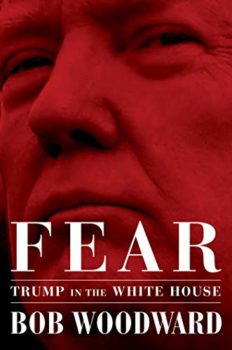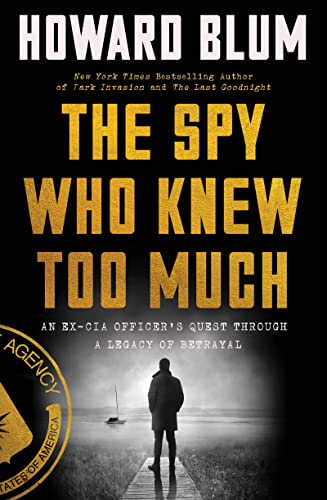
Here comes Bob Woodward’s new book with the latest wrinkles in the tangled story of Donald Trump and his conduct in the White House. It might seem that everything of note has already been said. But Woodward demonstrates his journalistic chops in this meticulously researched account. Fear is far and away the most substantive of the nearly one dozen books I’ve read on Donald Trump’s presidency.
Estimated reading time: 6 minutes
Yes, others have written in a serious vein. David Frum (Trumpocracy) and David Cay Johnston (It’s Even Worse Than You Think) have made especially useful contributions. But none of the previous books I’ve read about the White House under Donald Trump has dived so deeply into how policy is made (or unmade) there. Woodward names names and quotes at length the participants in secret policy meetings and private conversations both in and out of the Oval Office. This isn’t gossip or conversations overheard in a hallway. It’s not just an indictment of Donald Trump’s erratic behavior and the sycophantic people who surround him. Fear is investigative journalism at its best.
Fear: Trump in the White House by Bob Woodward (2018) 357 pages ★★★★★
Two shocking revelations in Bob Woodward’s new book
The Prologue to Fear leads off the book with a shocking revelation. To prevent President Trump from terminating a vital US trade agreement with South Korea, Gary Cohn simply stole a letter from Trump’s desk in the Oval Office. Cohn is the former president of Goldman Sachs and was then Trump’s top economic adviser in the White House. The military, the intelligence community, and almost every White House adviser around Trump had made it clear that if he signed that letter it “would risk losing vital intelligence assets crucial to U.S. national security.” More plainly put, instead of detecting North Korean missiles seven seconds after they launched, the US could be forced to rely on equipment in Alaska that would require 15 minutes. And an ICBM launched from North Korea would take only 18 minutes at most to reach any major city in the United States.
Woodward later notes that “that document and others like it just disappeared.” So, Cohn’s action wasn’t a one-off, and he wasn’t alone in hiding documents to forestall dangerous actions by the president. Whoever wrote that anonymous Op-Ed in the New York Times about an “internal resistance” was right on the money.
An even more troubling revelation comes much later in Fear. Woodward reveals that “President Trump’s tweets may have come close to starting a war with North Korea in early 2018. The public never learned the full story of the risks that Trump and North Korean leader Kim Jong Un took as they engaged in a public battle of words.” The explanation that follows is chilling. It appears that Kim Jong-Un might well have launched one of those missiles. Trump was cavalier in dealing with Kim because he simply didn’t believe what his military advisers knew to be true: North Korea’s ICBMs could, indeed, reach the continental United States.
Woodward covers all the bases
Woodward covers all the bases, from Korea to Iran to trade, immigration, climate change, and the Mueller investigation. He reproduces conversations staff members had with Trump and among themselves. The major players in the drama come to life in wholly believable exchanges. Given what others have written about the Trump White House, you won’t be surprised to learn that most of those conversations feature an abundant use of the F-word. Trump himself is fond of a word about excrement that begins with the letter S.
In a Note to Readers at the front of the book, Woodward writes that “interviews for this book were conducted under the journalistic ground rule of ‘deep background.'” At first, that’s difficult to understand, since speakers are identified by name in almost every conversation. But Woodward explains that “nearly all allowed me to tape-record our interviews.” The quotes, then, must come from those who were themselves on the scene.
A more balanced account
Woodward’s account is more balanced than nearly all the other reporting I’ve read about Trump. He is, after all, a Republican. He goes out of his way to report that:
- Despite widespread impressions to the contrary, Trump thoroughly reads some newspapers on a daily basis. [In other words, the man is able to read, although he has never been known to read a book, and he ignores the briefing books and papers he’s given on a daily basis. Do you wonder, as I do, how Donald Trump ever got through college?]
- He occasionally listens carefully and asks good questions [even if he later ignores everything he’s been told].
- He doesn’t always lash out angrily at criticism [but even then he’s likely to bad-mouth the critics behind their backs].
All this makes Woodward’s overall assessment even more devastating. As Trump’s first Secretary of State, Rex Tillerson, famously remarked, the President is an “f***ing moron.” Woodward’s account supports that conclusion. Most of the time, Woodward makes clear, Donald Trump acts like a blowhard in a bar after too many drinks.
What other reviewers have written
As John Diaz writes in reviewing the book for the San Francisco Chronicle (September 23-29), “Fear is Woodward at his best, the quintessential investigative reporter with an eye for detail and an uncanny ability to get key players to ensure that their perspective is etched into history.”
Writing in the Guardian (September 16, 2018), Peter Conrad notes that “Bob Woodward’s Fear: Trump in the White House . . . takes its title from Trump’s claim in an interview that power depends on frightening people. Yet in Woodward’s meticulous account of office intrigues, the president’s men don’t seem to be trembling with fright. What they mostly feel is contempt for Trump or pity for his ignorance and the ‘teenage logic’ of his obsessively vented grievances.
George Packer’s “Talk of the Town” article in the New Yorker (September 24, 2018) is even more devastating. “There’s nothing comparable [to Fear] in American journalism, except maybe Woodward’s ‘The Final Days,’ co-written with Carl Bernstein, about the downfall of Richard Nixon. Yet even Nixon—drunk late at night and talking to paintings in the White House residence—seems relatively sane and pitiable compared with Donald Trump. You half expect to find Woodward’s Trump ordering the execution of the entire National Security Council, declaring himself a god on Twitter, then anointing his daughter as heir to the throne.”
About the author
Bob Woodward is a legend in the world of investigative reporting. His most famous revelation was, of course, the story behind the Watergate break-in that brought down Richard Nixon. But he has written dozens of books in the 44 years since then, including 12 national bestselling nonfiction works. Fear has outsold them all.
For related reading
I’ve also reviewed the 2021 book, Peril by Bob Woodward and Robert Costa (Bob Woodward’s revealing new book about the Trump-Biden transition).
Fear is just one of the 15 books about Donald Trump and his impact on American democracy.
Like to read books about politics and current affairs? Check out Top 10 nonfiction books about politics.
And you can always find my most popular reviews, and the most recent ones, on the Home Page.



























